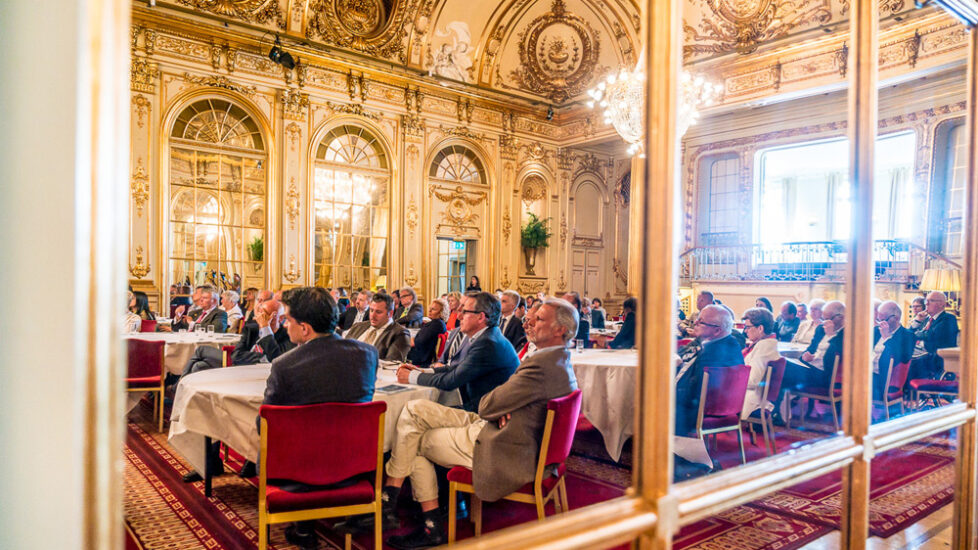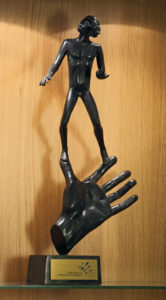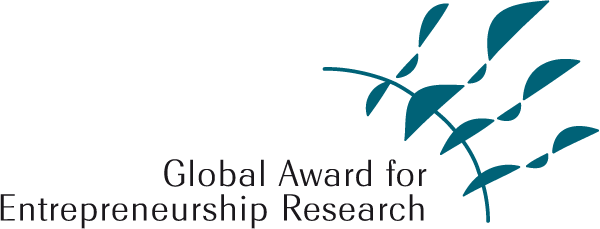
In 1996 Swedish Foundation for Small Business Research (FSF) and the Swedish Agency for Economic and Regional Growth (Nutek) instituted the International Award for Entrepreneurship and Small Business Research. In 2008 the Research Institute of Industrial Economics (IFN) joined FSF and Nutek to become the third partner in awarding the Prize.
 At the same time the Prize sum was doubled to 100,000 euros, the name of the Prize was changed, and the procedure for nominating and evaluating prospective Award Winners was strengthened.
At the same time the Prize sum was doubled to 100,000 euros, the name of the Prize was changed, and the procedure for nominating and evaluating prospective Award Winners was strengthened.
The partnership of IFN became possible thanks to a generous donation by the Swedish entrepreneur and industrialist Rune Andersson and his holding company Mellby Gård AB.
In 2009 Nutek changed its name to Tillväxtverket, and FSF changed its name to Entreprenörskapsforum. In 2013 Tillväxtverket was replaced by VINNOVA and Melker Schörling joined as donor. Between 2016 and 2018, Stockholms Köpmansklubb was the donor. Between 2019 and 2022, Lars Backsell was the donor. In 2023, the Research Institute of Industrial Economics (IFN) decided to leave the collaboration. In 2024 the Royal Swedish Academy of Engineering Sciences (IVA) joined as a partner.
A more detailed description about the Award can be found in the article “The Global Award for Entrepreneurship Research” by Magnus Henrekson and Anders Lundström published in Small Business Economics and in the article “Awarding Entrepreneurship Research: A Presentation of the Global Award” by Pontus Braunerhjelm and Magnus Henrekson published in Entrepreneurhsip Theory and Practice.
Small Business Economics and Springer Publishing have entered into an agreement with the three organizations behind the Global Award for Entrepreneurship Research and will publish the presentation of the Award Winner as well as the prize lecture. A more detailed description about the partnership can be found in the article “In Partnership with The Global Award for Entrepreneurship Research” by Editors-in-Chief Zoltan J. Acs and David B. Audretsch published in Small Business Economics.
A discussion about the evolving domain of entrepreneurship research written by Bo Carlsson, Pontus Braunerhjelm, Maureen McKelvey, Christer Olofsson, Lars Persson and Håkan Ylinenpää can be found in an article published in Small Business Economics.
Criteria
According to the statutes the Award should be given to “a person who has produced scientific work of outstanding quality and importance, thereby giving a significant contribution to theory-building concerning entrepreneurship and small business development, the role and importance of new firm formation and the role of SMEs in economic development.”
Hence, the prime reason for receiving the Award is outstanding scientific achievement. In addition, other aspects may be factored in. The ambition behind the Award is threefold:
(1) to highlight the importance of research produced in the areas of entrepreneurship and small business
(2) to further stimulate and promote research within these fields, and
(3) to diffuse the state-of-the-art research among scholars, policymakers, practitioners, and people involved in small business development.
What is rewarded?
A prize worthy contribution needs to be original and influential. One can think of many ways in which a contribution is influential, notably through its impact on subsequent scientific work (normally by virtue of the scientific work per se, but sometimes through the organization of large research programs), by furthering entrepreneurship as a field (by creating important data bases, by starting influential journals, scientific communities etc.), by furthering entrepreneurship education and training at the academic level, and by influencing policy making and society more broadly.
Over a longer time span the Award winning contributions should reflect the extraordinary width of entrepreneurship as a social science field, spanning the entire spectrum from anthropology to theoretical microeconomics, and its methodological diversity.
The prize may reward contributions to all relevant aspects of entrepreneurship, including:
(1) the environment and the organizations in which entrepreneurship is conducted;
(2) the character of the entrepreneur (personality, cognitive and affective aspects);
(3) the entrepreneurial process; and
(4) the role of the entrepreneur and/or the entrepreneurial function in a wider sense (at the level of the community, region, country, industry).
All four aspects are highly relevant, and a scholar may be rewarded for contributions to any of them.
Nomination
Nominations for the award are open from May or June until the end of August every year. Entreprenörskapsforum is responsible for maintaining a list of full professors at Swedish universities who are entitled to nominate candidates. Members of the prize committee are entitled to nominate, but self-nominations are not allowed. Invitations to nominate are also extended to:
- All previous Award Winners;
- The editors and the members of the editorial boards of the journals in entrepreneurship and small business research included in the Social Sciences Citation Index: Journal of Business Venturing, Entrepreneurship Theory and Practice, Small Business Economics, Entrepreneurship and Regional Development, Journal of Small Business Management and International Small Business Journal, and Strategic Entrepreneurship Journal.
These nominations provide the first step in the creation of a list of potential candidates considered by the Prize Committee. It is at the discretion of the Committee to decide which candidates should be targeted for a more thorough evaluation. A candidate can be short-listed for several years and therefore during that time be regarded as a potential candidate for the Award.
Selection
It is imperative to ascertain a high-quality selection process characterized by continuity and robustness. Therefore, the eventual selection of the Winner is based on thorough evaluations and comparisons of a number of worthy candidates, and the pool of candidates from which the Winner is selected must be reasonably stable, reflecting the long-term efforts of the Prize Committee.
The Committee “inherits” a limited number of short-listed candidates from the previous year, and except in rare cases the Winner is selected from this pool of short-listed candidates. The Committee adds one or two new candidates to this pool based on nominations and discussions in the current and previous years. The Committee then commissions a specialist to evaluate the scholars added to the pool of candidates. In some cases, the commissioned expert may be a member of the Prize Committee, but this is an exception rather than a rule. The outside evaluations are strictly confidential.
The discussions within the Committee are strictly confidential; it is not allowed to report to outsiders the various considerations that lay behind individual Prizes and candidacies.
Once the Committee has agreed on a Winner, the committee will write an official motivation. One or several members of the Committee will also coauthor a presentation of the Winner’s contribution together with the outside specialist who wrote the confidential report.
Announcement
The Award Winner is announced during spring. After the announcement the Award Winner is requested to prepare a publishable Prize Lecture that can be delivered at the official Award ceremony in Stockholm around May 15th.
The Award is typically conferred by a cabinet minister, a member of the royal family or some other distinguished public personality. The Winner is then expected to tour Sweden during the Entrepreneurship Week, the annual seminar tour of Swedish university cities taking place during the week when the Award is conferred, i.e. around the 15th May.

